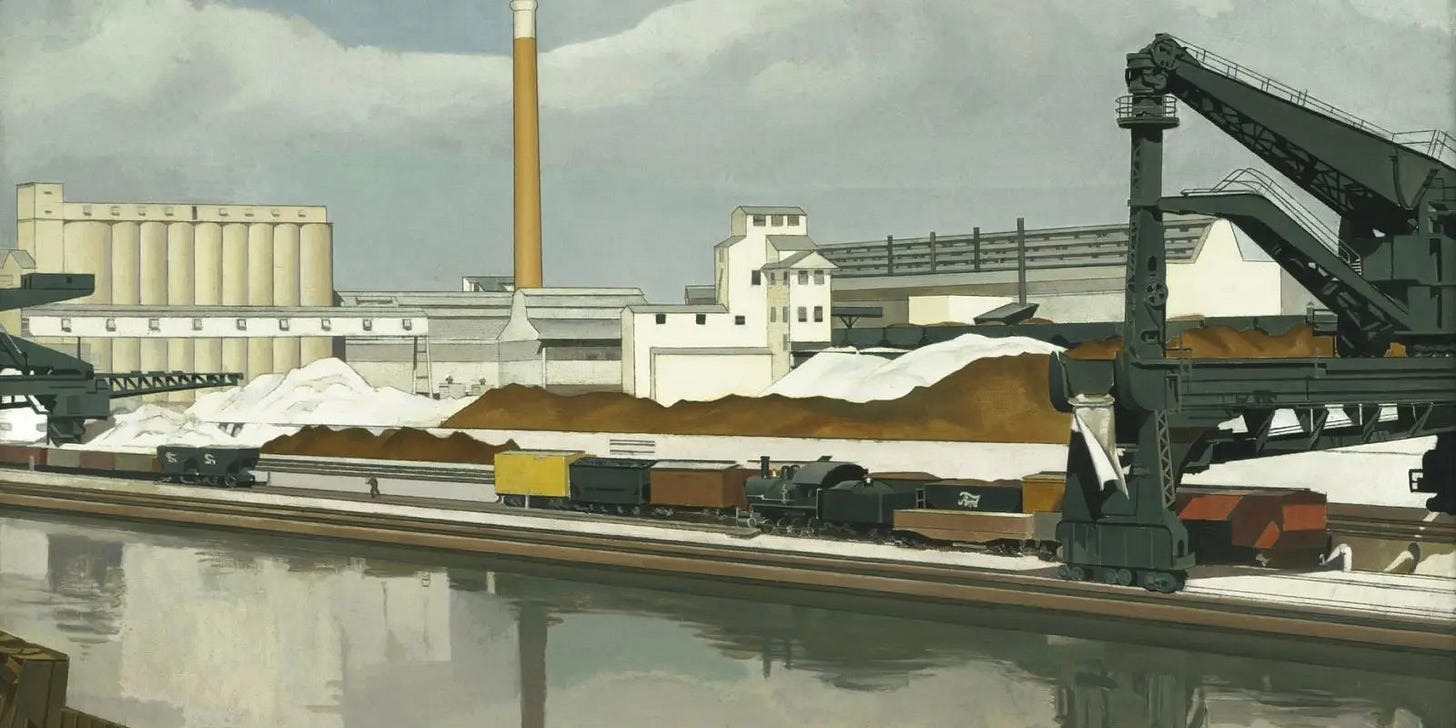Does the U.S. Need a Vigorous Industrial Policy?
Christine McDaniel and Phil Levy discuss the opportunities, problems and pitfalls of industrial policy
By Phil Levy and Christine McDaniel
The seeming success of much of China’s state-backed economy has prompted many American political leaders, including the new president, to call for a more vigorous industrial policy. Indeed, during the 2020 presidential campaign, then-candidate Joe Biden said he would “mobilize the full power of the federal government to bolster American industrial and technological strength.”
But what exactly is industrial policy? And can it help make those industries it seeks to help stronger and more competitive? To answer these and other questions, we asked Christine McDaniel to discuss the ins and outs of industrial policy with Phil Levy. McDaniel is a senior research fellow at the Mercatus Center, where she studies trade, globalization and property rights. Levy is chief economist at Flexport, a freight logistics firm.
Christine: So, Phil, what does “industrial policy” mean, anyway?
Phil: Well, we are certainly hearing new enthusiasm these days about industrial policy. It seems to have proponents or converts on both sides of the aisle. This either means that a new consensus has emerged, or it means that the term is being used so loosely that it has lost its original meaning. I’ll go with the latter; it now means different things to different people. Perhaps it would be better to ask: What could it mean? And what should it mean?
Christine: It could mean increased government spending on education, infrastructure and basic science. These things, the provision of public goods, are the things that the government is relatively good at. On the other hand, it could mean a set of policies aimed to promote up-and-coming industries or easing the fall of declining ones.
Proponents of industrial policy point to the success of the federal government’s investment policy during the Cold War, which powered the rise of the Space Age, among other amazing things. But that started out more as a military project. Sputnik was a “focusing event.” And that set off a great burst of basic science and R&D investments, and even changed U.S. education with the National Defense Education Act.
Today’s industrial policy discussion tends to emerge from rising geopolitical threats from China. But technology is largely the modern-day theater of great power competition. So there are some parallels, but still there is a big difference between “Buy American” policies and import protection, and a coordinated effort to enhance our technological capabilities we saw during the Cold War.
Phil: Right. I’m all in favor of industrial policy as long as we mean the provision of public goods and not picking winners and losers. Yes, we should have highways and railroads and ports and support basic science. Of course, what most people mean by industrial policy is that “we should identify critical technology sectors, and we should provide direct support to those sectors.” I’m much more skeptical on that, and I’ll give three reasons:
First, if you look at the history of the tech sector, computing for example, it wasn’t that we had one champion who emerged all the way along. You went from IBM to Microsoft to Google, and from mainframes to laptops to the cloud. Pick the era where you want to freeze things because often having government support and picking a champion means freezing things. But that’s not how the tech sector has advanced.
Phil Levy
Second, the argument that the government has to really get in here and do this is usually premised, when we make our public goods argument, on the need for more financing. We are in a world of soaring tech stock prices and special purpose acquisition companies offering public market financing with few questions asked. I’m not sure undersupply of funds is our primary problem.
And finally, as you say, the government doesn’t tend to be very good at picking the winners from the losers, or especially, abandoning the losers once their deficiencies become clear. There are all kinds of mistakes made in the private sector. When those mistakes are made—look at Quibi—they just go under and people cut their losses, even if it’s a very distinguished backer like Quibi co-founder Jeffrey Katzenberg.
Governments have a hard time doing this. As a foretaste of the difficulty, consider this: It sounds great to support key sectors, but if we are going to do that, let’s just start by defining which sectors are not key. I am really interested to see that list. I suspect it will be short.
Christine: Many readers will recall the big discussion around high tech industrial policy in the ‘80s and ‘90s with respect to Japan. Whenever we face a big external threat, industrial policy tends to surface in policy discussions. Why do you think that is?
Phil: Reliance on invisible hands is discomfiting. When we face a big external threat, leaders want to be seen to be doing something about it. Of course, they can do a number of things that can be very constructive. They can support basic research. They can maintain an economic environment that rewards investment and entrepreneurialism. But none of that will sound as dramatic and directed as billions of dollars appropriated to counter the Chinese challenge in solar panels.
Christine McDaniel
Christine: President Biden recently signed a “Buy American” executive order. In terms of the economic effects, this is basically similar to a local content rule. And we all know how those turn out (hint: not great). If it is temporary and comes at a time when domestic demand needs a boost, then the demand effects can outweigh the inefficiency effects. Setting aside whether we need the domestic demand boost (let the Fed figure that out), the real problem with things like Buy American rules is that they stay around for way too long. They are easy to do, but hard to undo. (Look at the government procurement rules from the ‘30s.)
Phil: Your point about the long-lived nature of protection (the actual tariff or restriction blocking competition, rather than “protectionism,” which is the belief that this is worthwhile) is well-taken and argues against its use as a way of making short-term economic adjustments. The Jones Act, which mandates a domestic shipping industry, was enacted in 1920, right?
Protectionism builds constituencies for inefficiency that take on a well-funded, well-organized life of their own. For example, consider the lobby for high fructose corn syrup, which primarily exists because of years of sugar protection. (Protection-inflated sugar prices led soft-drink producers and others to search for a cheaper alternative, and HFCS fit the bill.)
It’s not really clear Biden’s Buy American order will have a big impact, but to the extent people think industrial policy needs to encourage domestic production over imports, there are three points we need to address:
First, we need to consider efficiency. We generally do not want our government to tax us any more than is necessary. If the government can buy computers for $800 a piece, we don’t want the government spending $1,000 a piece. We are usually quick to decry that sort of waste and inefficiency. Yet it’s at the heart of a preferential buying program, like Buy American. If U.S. firms make the best and cheapest products already, then they don’t need preferences. If U.S. firms make more expensive, lower-quality products, then this is costing taxpayers money.
Second, there are issues of reciprocity. The U.S. has been trying to encourage open procurement markets around the world for a reason: We’re good at providing a lot of the equipment and services that governments buy. U.S.-based firms will do well under fair, open competition. If we set the precedent that countries can limit bids to favored domestic firms, other countries whose firms are nowhere near as competitive will be glad to follow suit.
And finally, there is the blurring of national identity. Both industrial policy and Buy American rules are premised on the idea that it is easy to distinguish between American firms and foreign firms. In practice, that’s gotten harder and harder over time. Do we identify a firm’s nationality by where it was founded? Where it is incorporated? Where its HQ is located? Where the majority of its employees work? Where the majority of its production takes place? Where the majority of its sales take place? Where it pays the most taxes? Where the majority of its shareholders reside?
Increasingly, those questions do not have a single answer. As but one example, look at Chrysler. It has over 50,000 employees. It was founded in the United States and was traditionally thought of as one of the Big Three American auto companies. But of late, it has been owned by an Italian company (Fiat) and run by a British national (Michael Manley). More generally, all of the Big Three now have highly integrated North American operations with important links to Canada and Mexico. The point: Any policy that is premised on clear corporate nationality is going to run into difficulty.
Christine: So now that we’ve explained everything, the ardor for industrial policy will cool off?
Phil: Hardly. It sounds sophisticated. It comes off as a measured response to what China is doing. And it lets politicians take an active role in distributing largesse. Who wants to stand in the way of that? I think we’re stuck with the term. Even opponents will embrace it and then stretch the definition so far that it becomes meaningless.






